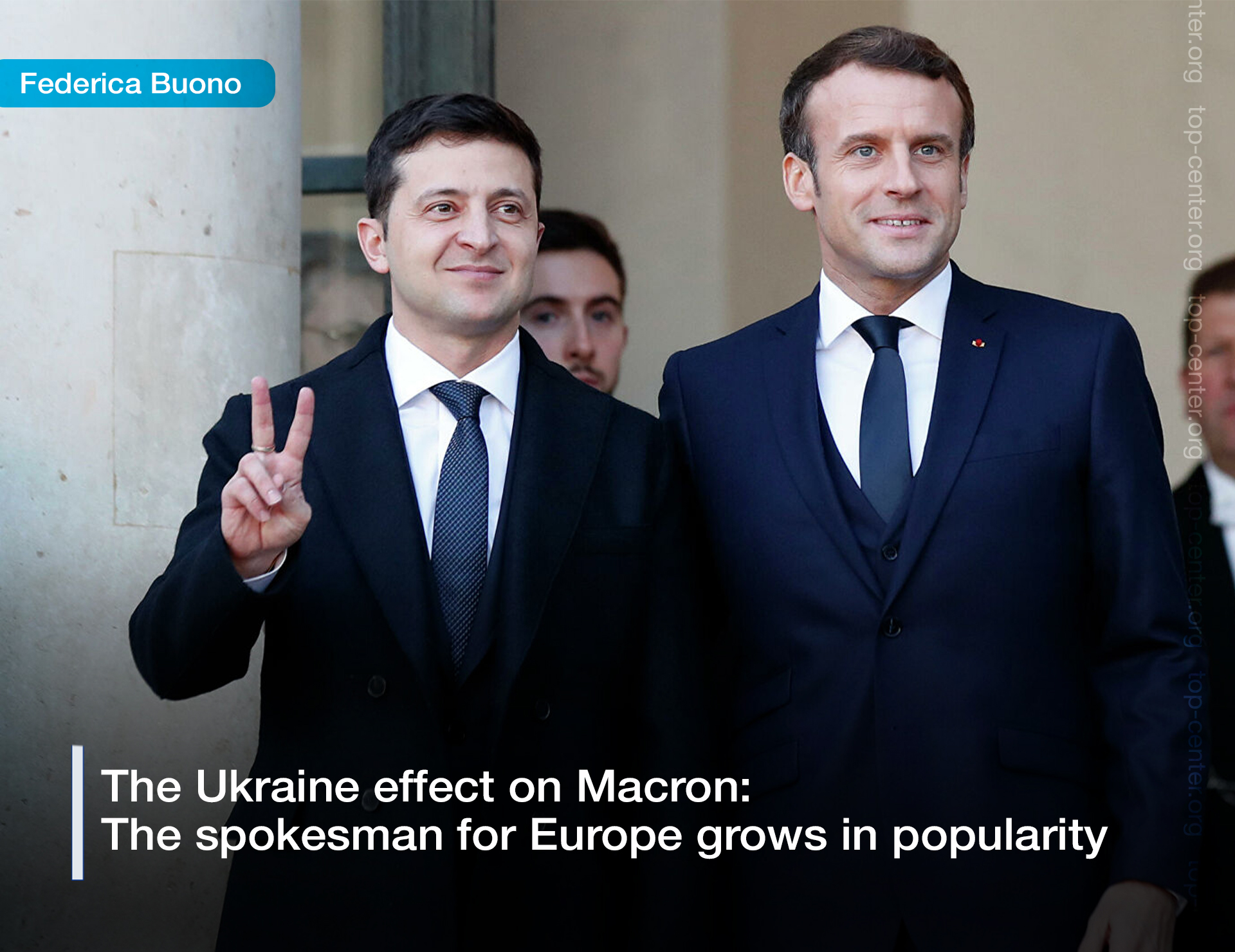The Ukraine effect on Macron: The spokesman for Europe grows in popularity

The war in Ukraine has not been slow in reflecting its consequences in Europe, especially in France where it is influencing the trend of the presidential elections scheduled for April 10th and 24th. Macron's candidacy was made official only a month before the elections and, currently, the polls seem to be foreseeing his re-election. Did the Ukrainian war boost his popularity?
In April French citizens of legal age will be called to the polls to vote for their new president on two dates, the first scheduled for April 10th and, with the expectation of no immediate majority, the second for April 24th. Indeed, five years have already passed since the present head of state, Emmanuel Macron, founder of the centrist party En Marche, triumphed with 66% of votes against his right-wing counterpart Marine Le Pen in 2017, becoming the youngest president of France.
To March 3rd, 15 candidates presented their electoral platforms, ranging from 38-year-old Helene Thouy, founder of Parti Animaliste, to 72-year-old Antoine Waechter with the environmentalist Mouvement Ecologiste Independent. However, it was on this very specific date that a plot twist was witnessed in the political French scenario, when the nominees have upgraded their number from 15 to 16, with the name of Emmanuel Macron unexpectedly appearing - even though to officially run for the presidency each candidate must reach 500 patronages. Actually, only 12 of them succeeded in this. Macron has announced his candidacy being in step with the times, publishing a letter addressed to the French people on his Twitter account and on other social media.
The current president formally declared his candidacy after previously admitting not being sure to run for the Elysée for a second time. However, this gesture has earned him a reprimand from the National Commission for the Control of the Electoral Campaign, which has invited the new candidate to eliminate the communication posted online. Indeed, this approach has been recognized as an attitude of electoral propaganda, as illustrated by the HuffPost, since this social media has been predominantly used by the president for a long time to release messages related to the exercise of his functions and, in accordance with the regulation, it is preferable not to use this account to spread such messages. Therefore, now it is no longer available on the President's official online channels, but it can be found easily on the web. According to Al Jazeera, his original plans not to run for the presidency for the second time have changed because of the Russian invasion of Ukraine, indeed in the message is written “Together we can work because this crisis period could be a starting point for a new French and European era”.
It must be admitted that at this peculiar time the whole electoral campaign is dominated by the Russian-Ukrainian issue, a situation that inevitably catches international attention and concerns and that is consequently likely to have led the French president to re-propose his political ideas and values to his country. It is interesting to highlight how, given the new framework of international developments, his narrative and political argumentation have also adapted to the challenges of the moment, building a discourse around both a national and European dimension. Macron has presented France as the founder of the European structure, the nation that has been able to build, by convincing its neighbors, a "powerful and capable" Europe and whose task will consist in working on the construction of a French and European reality in order to find the necessary answers to face the adversities of this century. It represents an appeal to “get moving” and be ready to embrace new directions, by evaluating the threats presented so far and the ones that will be coming along the way, thus a recall to his political party En Marche that translated means both working and moving.
Such statements, together with the war in Ukraine, have not only caused some difficulties for his far-right rivals Le Pen and Zemmour, known for their support on different occasions to Putin's Russia and their Russophile behaviors, but they also have increased his popularity among French voters. For instance, taking into account a survey conducted by Opinion Way Kea Partners for Les Echos, one of the most famous French economic and financial newspapers, six out of ten French people considered themselves satisfied with the way in which Emmanuel Macron is handling the Ukrainian conflict and its repercussions on Europe. Indeed, since the beginning of the tensions, he has tried to propose himself as one of the main mediators between Kyiv and Moscow and has led a dynamic relay race to meet Russian president Vladimir Putin and his Ukrainian counterpart Volodymyr Zelenskyy during the last months. The French head of state has embraced diplomacy from the first moment by privileging dialogue aimed at avoiding an escalation. Although in the light of current events this attempt has not given the desired results, he has acted by virtue of ensuring security in the direct area of tension and the entire European continent so this has led his popularity index to grow.
Following the data published by the Paris Match periodical magazine on March 8, President Macron "beats all popularity records''. The increase of 11 points has led him to hold the third position among the favorite people of French citizens in the Ifop-Fiducial scoreboard for Paris Match and Sud-Radio. The article showed how the Ukraine effect has allowed such a leap, with 51% of the French population having a good opinion of Macron. In addition, while the consensus grows for him, the confidence in the other presidential candidates has been decreasing, except for the opponent of the left-wing Jean Luc Mélenchon. Overall, RTL.FR speaks of figures higher than predecessors François Hollande and Nicolas Sarkozy, with the first one having a score of 22% in February 2017 and the second one 32% in February 2012.
Likewise, during the recent weeks, the picture has not changed much, according to an Ipsos Sopra Steria poll (21-24 March) Macron still remains in the lead ahead of his historic right-wing rival Marine Le Pen. Jean Luc Melenchon, the candidate of the radical left, grew by one point, overtaking Zemmour in the polls both followed by Valerie Pecresse. It would seem therefore that the current president could achieve a “second season” of his mandate.
Given the certitude of Macron's candidacy, his commitment to work for the resolution of the Ukraine war, his renewed popularity and confidence, and his France-Europe dialectical narrative, could the opposing far-right consider a hypothetical coalition against the current president?
Analyzing the French political framework and according to the picture provided now, the option of an alliance between the center-right candidate Valerie Pécresse and her far-right opponent Eric Zemmour would be ruled out. The two, although both coming from a Gaullist tradition, following a public debate held on 10 March and broadcasted on the French television channel TF1, have shared an incompatible political agenda in terms of immigration, women’s role, and retirements. As for the situation on the far-right wing, if at first a union seemed unlikely, given the mutual hatred of the two main representatives Jean Marie Le Pen of Rassemblement National and Eric Zemmour of Reconquete, and the failed attempts already made for the 2018 European elections, after Macron's candidacy it could be possible. Even Le Pen's niece Marion Marechal, who has switched to supporting her rival Zemmour, seems to have understood that an approach with the Reconquete party leader could mean a key to success. Le Pen has considered the niece a traitor, so could this be the beginning of a deep and irrecoverable rift? Or actually the start of the construction of an alliance against the favorite Emmanuel Macron?
Politically this last option would make sense because the war in Ukraine has made the current French president's popularity soar and a new partnership in the far-right wing would give his figureheads a better chance of holding a public confrontation. Nevertheless, the catastrophe that is happening these days in Ukraine has allowed Emmanuel Macron to boost the consensus. Indeed, even if the presentation of the official agenda with the start of the electoral campaign on March 28th has encountered his percentage of voting intentions decrease slightly, Macron keeps the lead thanks to what the French journalist Nathalie Saint-Cricq calls the flag effect. According to this concept, his advantage derives from the moment of uncertainty and instability that the French nation, along with the world, is experiencing. Macron has become the spokesman of France and Europe, the mediator always open to dialogue, the potential protector, in short, the one who tries to infuse safety in a time where the idea of security seems to be becoming increasingly utopian.







